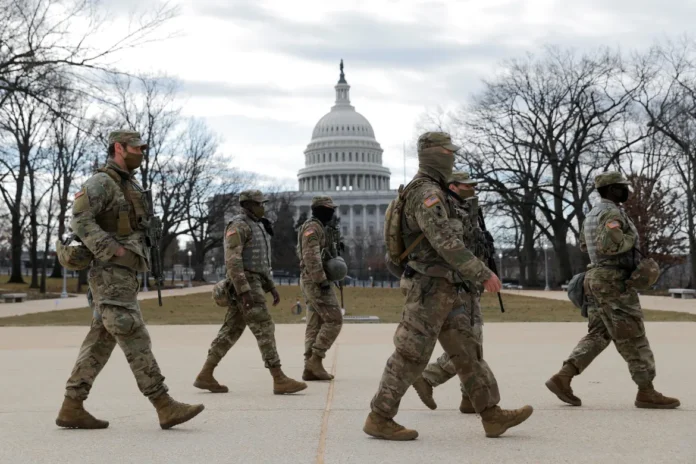A New Escalation in the Nation’s Capital
Tensions in Washington, D.C., reached new heights this week as some National Guard units began carrying firearms while supporting federal immigration enforcement measures. The move, ordered under President Donald Trump’s immigration crackdown, has sparked fierce debate among lawmakers, civil rights groups, and residents of the capital.
Why the National Guard Is Armed
According to defense officials, the arming of certain Guard units is designed to bolster security for federal agents conducting operations tied to immigration enforcement. The administration argues that heightened readiness is necessary to ensure officer safety amid growing protests and resistance to deportation raids.
“Public safety and mission success require preparedness,” said one Pentagon spokesperson. “Equipping Guard units with firearms ensures they can respond to potential threats while supporting immigration enforcement.”
Rising Political and Social Tensions
Critics warn that the deployment of armed National Guard troops in a domestic immigration context risks blurring the line between military defense and civilian law enforcement.
- Democratic lawmakers argue that arming soldiers in the capital sets a dangerous precedent, signaling an over-militarization of immigration enforcement.
- Civil rights advocates fear the move could intimidate immigrant communities and escalate tensions during protests.
- Supporters of the crackdown insist that armed Guard units are necessary to maintain order and protect federal personnel from potential unrest.
Representative Linda Chavez of California called the development “a disturbing expansion of military involvement in civil matters,” while Trump allies countered that “lawlessness must be met with strength.”
The D.C. Context
Washington, D.C., has a unique status under federal law, with the President maintaining direct authority over National Guard deployments. This makes the city a testing ground for federal policy moves that might not be as easily executed in states with governors holding control over their own Guard units.
Local officials have expressed concern about the optics of soldiers carrying weapons in neighborhoods already on edge due to heightened immigration enforcement actions.
Residents React
For many D.C. residents, the sight of armed Guard members patrolling streets feels unsettling.
- A local shop owner near Columbia Heights said: “I’ve never seen this before. It feels like we’re living under martial law.”
- A student activist participating in recent immigration protests warned: “Bringing guns into this already tense situation only increases the risk of violence.”
- Others supportive of Trump’s crackdown argue that “law and order” requires visible strength and that the Guard’s presence makes them feel safer.
Legal and Constitutional Questions
Legal scholars point out that while the President has authority over D.C.’s National Guard, using armed military units in immigration enforcement could trigger constitutional challenges. Questions surrounding Posse Comitatus—the longstanding law limiting military involvement in domestic law enforcement—are likely to intensify as lawsuits from advocacy groups emerge.
What Comes Next
Administration officials have hinted that the arming of Guard units could expand if immigration protests grow or if resistance to federal raids intensifies. Meanwhile, Democratic leaders in Congress are preparing hearings to examine the decision, arguing it represents a dangerous overreach of executive authority.
The situation underscores how Trump’s immigration crackdown has become a flashpoint not only in border states but also in the nation’s capital—where symbolism and policy collide on the streets of Washington.
Conclusion — A Nation on Edge
The deployment of armed National Guard units in Washington, D.C., marks a dramatic new chapter in President Trump’s immigration enforcement strategy. As federal agents press forward with operations and protests mount, the nation faces a delicate balance between public safety, civil liberties, and the role of the military in domestic affairs.




